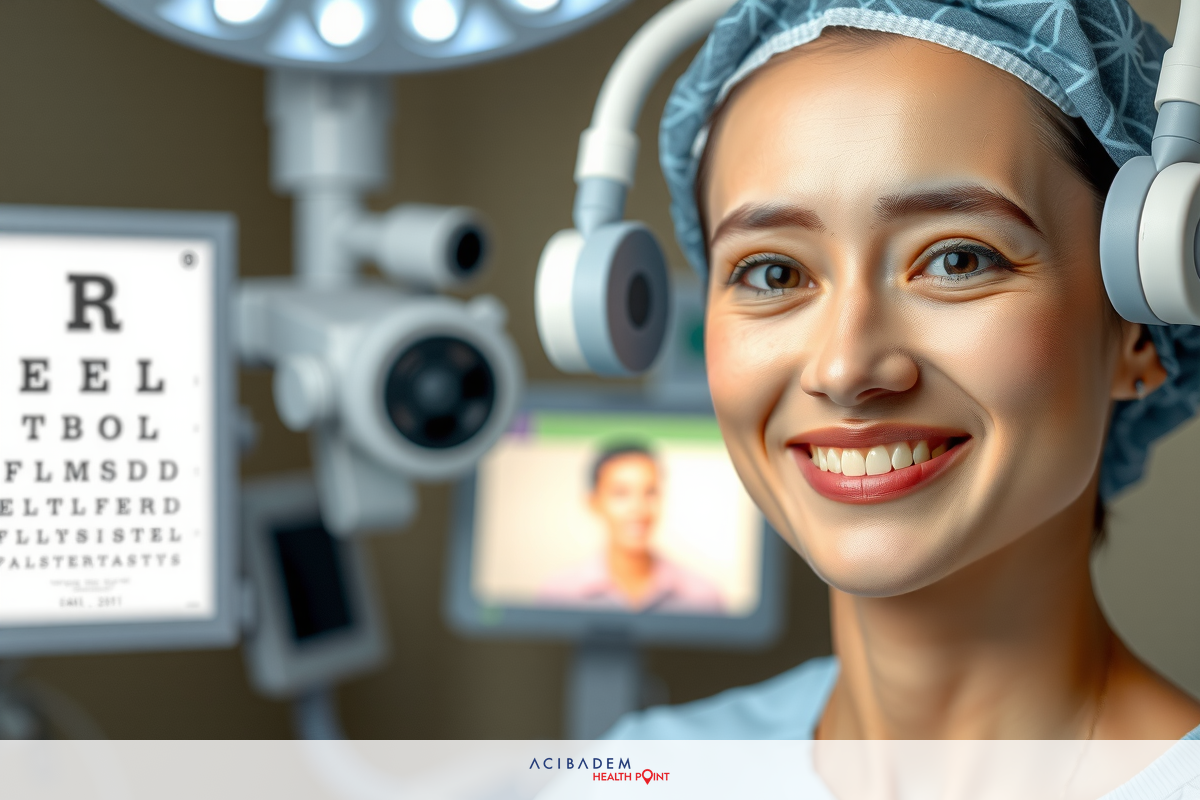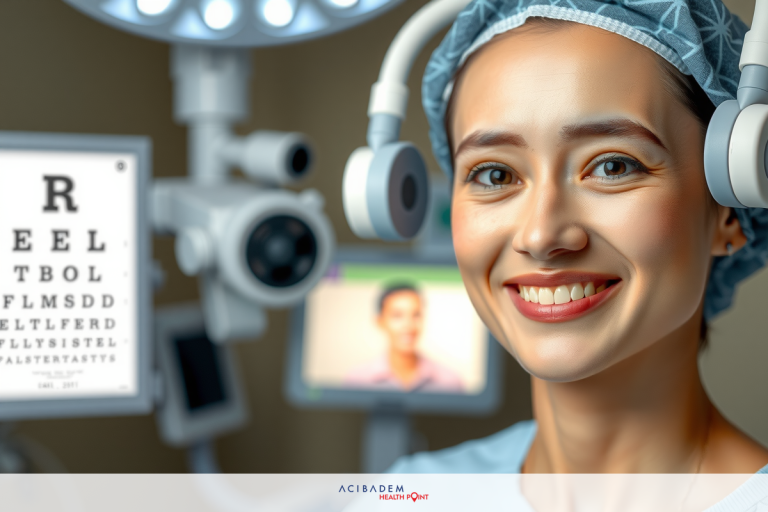Is Laser Eye Surgery for Reading Glasses?
Is Laser Eye Surgery for Reading Glasses? Reading glasses have been a classic solution to correct nearsightedness and farsightedness. But in our modern world where technology is quickly evolving, an innovative alternative has emerged that promises freedom from these spectacles: laser eye surgery.
Laser eye surgery offers a revolutionary way of correcting vision without the need for reading glasses. It’s not magic but science at work! Imagine going about your day, reading books or browsing on your smartphone without having to reach out for your reading glasses every time. Sounds liberating? That’s exactly what this article aims to discuss – how laser eye surgery could be the answer to dependency on reading glasses.
What Is Laser Eye Surgery?
Laser eye surgery, sometimes also known as refractive eye surgery, is a type of treatment designed to correct common vision problems. These can include nearsightedness and farsightedness which often necessitate the use of reading glasses. The goal of this procedure is to reshape the cornea, which is the clear front part of your eye.
The process begins with numbing your eyes using anesthetic drops so that you won’t feel any discomfort during the operation. A small flap in your cornea is then created by either a laser or a tiny blade. This flap allows access to another part of your cornea that needs correction.
Once this step has been completed, pulses from another specialized laser are used to make necessary corrections on your exposed cornea. Each pulse removes an incredibly small amount of corneal tissue allowing for precise control over how much reshaping occurs. After all adjustments have been made, the surgeon folds back down the previously created flap and voila! Your surgery is complete.
This technique has revolutionized vision correction procedures because it eliminates many issues associated with traditional methods such as wearing reading glasses or contact lenses. With successful laser eye surgery, patients can achieve 20/20 vision or even better without relying on visual aids.
Now it’s important to understand that everyone’s experience with laser eye surgery will be unique due their individual circumstances such as their specific level of nearsightedness or farsightedness among other factors like age and general health condition.
Even if you’re not eligible for this particular type of surgical intervention there are numerous alternatives available in modern ophthalmology today providing hope for every person dreaming about living without constantly reaching out for reading glasses.
Remember though! Before making any decisions it’s crucially important to consult with experienced professionals who can provide bespoke advice based on detailed examinations tailored specifically according to one’s individual needs and concerns related to vision correction options.
Benefits of Laser Eye Surgery
When we ponder over the benefits that laser eye surgery can provide, it’s like opening a window to a world unencumbered by reading glasses. Imagine being able to see clearly without having to constantly adjust your glasses or worry about forgetting them at home. It seems almost too good to be true, but with modern advances in vision correction technology, this dream is becoming a reality for many.
- No More Glasses: Perhaps the most obvious benefit of laser eye surgery is the potential freedom from your reading glasses. After successful surgery, you may no longer need these aids for tasks such as reading or looking at small print.

The image shows a woman wearing medical scrubs. She is smiling towards the camera, indicating that she is in a professional and friendly environment, possibly a medical setting. - Better Vision: Laser eye surgery often results in an improved quality of vision compared to what you might achieve with glasses or contact lenses.
- Quick Recovery: One surprising advantage of laser eye surgery is how quickly patients can return to their normal activities following the procedure – often within just 24 hours!
- Long-Lasting Results: The effects of laser eye surgery are designed to last – after a short period of adjustment and healing post-surgery, improvements should remain stable overtime.
- Cost Savings Over Time: While there may be upfront costs associated with laser eye surgery, over time you could save money as you won’t have ongoing expenses for new glasses or contacts.
- Increased Self-confidence: Lastly but not least important; many patients report feeling more confident after undergoing the procedure because they’re no longer dependent on corrective eyewear for daily activities which boosts their overall self-esteem and quality of life.
It’s worth noting though that every surgical procedure comes with its own set of risks which must be thoroughly discussed and understood prior deciding on whether it’s right option tailored specifically according one’s individual needs – remember always consult professionals before making any decisions about your health!
Choosing the Right Surgeon
When it comes to laser eye surgery, a crucial aspect of your journey towards vision correction is selecting the right surgeon. This decision can be as significant as deciding whether or not to proceed with the operation itself. After all, you’re entrusting someone with one of your most sensitive and vital senses – your sight.
Firstly, find out about their qualifications and experience. Has this person completed specific training in refractive surgery? How many operations have they performed? Experience matters greatly because every patient’s eyes are unique and an experienced surgeon will have encountered a wide variety of cases during their practice.
Remember that even though technology plays a big role in laser eye surgery, much still depends on the skill of the surgeon operating those high-tech devices! Consider asking for referrals from friends or family who have undergone similar procedures or look up reviews online to get an idea about other patients’ experiences.
Secondly, ensure that your chosen professional communicates well. Do they take time explaining things clearly without rushing through important details about pre-operative preparations, potential risks involved or post-surgery care routines? It’s essential that you feel comfortable asking questions and expressing any concerns you might have so good communication skills play key part here!
Thirdly, think about logistics too – where is this doctor’s office located? Is it easily reachable for follow-up visits? What kind of support structure do they offer after hours if needed?
Lastly but definitely not least important, don’t forget to discuss costs! Laser eye surgeries can vary in price depending on various factors including location and specifics related to each individual case hence always make sure you understand what exactly you’re paying for before making final decisions.
Choosing a qualified and reputable surgeon increases chances for successful outcome providing hope towards living free from constant dependency on reading glasses which ultimately improves overall quality of life! But remember – no matter how enticing prospects may seem always consult professionals prior making any health-related decisions.
Frequently Asked Questions
What is the success rate of laser eye surgery?
The success rate of laser eye surgery is generally high. Most patients achieve 20/20 vision or better following the procedure. However, individual results can vary based on factors like age and overall health.
Can everyone stop using reading glasses after having Laser Eye Surgery?
While many people undergoing laser eye surgery find they don't need their reading glasses as much or at all, this isn't always the case. Factors such as age and degree of farsightedness can influence one's dependency on reading glasses post-surgery.
How long does it take to recover from Laser Eye Surgery?
Recovery times vary but most patients return to their normal activities within a day or two post-surgery. There may be some initial discomfort or blurred vision immediately after the procedure, but this typically resolves quickly.
Are there any risks involved in Laser Eye Surgery?
As with any surgical procedure, there are potential risks with laser eye surgery too. These could include dry eyes, glare, halos around lights etc., though these side effects are generally temporary and resolve over time. Please note that these answers are for informational purposes only and do not constitute medical advice, always consult professionals before making any decisions related to your health!








